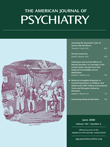Exacerbation of Recurrent Depression as a Result of Treatment With Varenicline
To The Editor: Varenicline, a partial alpha 4 beta 2 -nicotinic receptor agonist, was approved by the Food and Drug Administration in 2006 for smoking cessation. Recently, Robert Freedman, M.D., (1) reported the exacerbation of schizophrenia in a patient after 1 week of varenicline use (2 mg daily), and Kohen and Kremen (2) described the induction of a manic episode in a bipolar patient who was challenged with 1 week of treatment with varenicline at 2 mg daily. The case reported below is of a patient who demonstrated exacerbation of recurrent major depressive disorder following 6 weeks of treatment with varenicline.
A 75-year-old Caucasian married man, with a 20-year history of recurrent major depressive disorder, presented with an acute exacerbation of depressive symptoms. The patient, who had been stable for several years while being treated with fluoxetine (20 mg), reported 3 weeks of mounting despondency. He correlated the onset of these symptoms with a fall in which he bruised several ribs and his shoulder, although he did not seek medical attention. After 2 days of hypersomnia, he experienced reversal of his sleep cycle, “unusual” dreams, and decreased appetite. He was anergic, irritable, sad, and preoccupied with guilt and the past. He also had thoughts of giving up.
The patient suffered from long-standing, chronic obstructive pulmonary disease and had smoked more than one pack of cigarettes per day for more than 45 years. Six weeks prior to presentation in the psychiatry clinic, he started varenicline for smoking cessation (under the care of an internist). Treatment began with 0.5 mg, once per day, for 3 days and then increased to 0.5 mg twice daily. After 1 week, varenicline was increased to 1 mg b.i.d. However, the patient continued to smoke three to four cigarettes daily. Additional medications included aspirin, niacin, and metoprolol. Reconsultation with the internist was advised, together with the discontinuation of varenicline and a brief course of clonazepam (0.5 mg nightly) to facilitate sleep. The patient chose to discontinue the use of varenicline immediately. On the third day, treatment with clonazepam was instituted (which has continued). The patient subsequently reported resolution of the depressive constellation within 2 weeks of discontinuing varenicline. He was no longer preoccupied with guilt and the past. His sadness, suicidal ruminations, and irritability were no longer present, and his mood returned to the previous baseline. His sleep substantially improved, and he no longer experienced unusual dreams. Treatment with fluoxetine was continued throughout the sequence. The patient’s smoking increased from three to four cigarettes daily to six to seven cigarettes daily; however, no re-challenge with varenicline was attempted.
When varenicline was discontinued and low-dose clonazepam was instituted, the patient’s acute depressive symptoms remitted and his clinical presentation returned to baseline. Dosages of fluoxetine and metoprolol were not changed, and the patient continued to smoke cigarettes on a daily basis throughout the sequence. His fall and physical injuries may have confounded any association of his depressive symptoms with the use of varenicline. It appears that the use of varenicline was instrumental, if not causal, in the exacerbation of his mood disorder.
Unlike earlier reports (1 , 2) , the interval to the induction of the psychiatric presentation following the challenge with varenicline in the patient was nearly 6 weeks. Additionally, treatment with varenicline proceeded in a stepwise fashion, starting at 0.5 mg daily. Clinicians should exercise caution when prescribing varenicline to their patients with established psychiatric disorders.
1. Freedman R: Exacerbation of schizophrenia by varenicline. Am J Psychiatry 2007; 164:1269Google Scholar
2. Kohen I, Kremen N: Varenicline-induced manic episode in a patient with bipolar disorder. Am J Psychiatry 2007; 164:1269–1270Google Scholar



